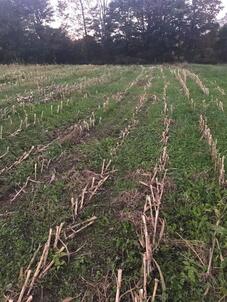CONSERVATION CORNER
A weekly blog for all things conservation
 By: Kevin Brown, Ag Team Leader Greetings. I am not necessarily going to go in this order, but these will be the topics of discussion. And I will ramble on in between topics. First topic, requests. We have had this column for a couple years now. We have hit many topics. We have heard good things about the column, and I want to continue with it, but truthfully, I am running low on topics. We have many topics that we have knowledge about- solar, electric vehicles/power equipment, fossil fuels, anything environmental, ponds, insects, streams, dirt and gravel roads, forests, crop production, and the list goes on. Please contact us with what your interests are. You can hit us up on Facebook, our website www.bccdpa.com , or call us directly. We are here for conservation, but more importantly, education. That is our passion. One topic that I would like to touch on, which might get readers a little excited, is Roundup (glyphosate). It comes in many forms, and it gets a really bad rap. Yes, I like to stay away from it as much as possible. However, there are times where I think it warrants use. Now, if you choose to be organic, or no spray, or anything along those lines, that is your choice, and you should go with that. However, I talk to people that think glyphosate is one step above, or maybe even below, the devil himself. I would like to point out a couple things that I have observed, and maybe you will feel a little bit better about it. First off, there are obvious alternatives- Mulching, pulling, organic solutions, etc. Use them at your discretion. However, some things organic may still not be what is best for other things. No till is one of the best things you can do for soil. However, commercially, it is very hard to get that to work for organic producers. So, they till. Sometimes a lot! That is one of the worst things you can do for soil. Which is right? I am not here to judge. We all do too much of that. I just want to educate a little bit. Oh yea, back to glyphosate. More and more commercial producers are using it because it works, it works well, and it is inexpensive. Contrary to popular belief, it can’t be as bad for the ground as some people believe. Every fall, when our crops are removed, there seems to be more and more green left behind (weeds, clover, etc.) there than ever before. If glyphosate was as toxic as some would have you think, there would be nothing there- like in years past when they used other chemicals. So, it seems like it is more environmentally friendly than past chemicals used. Just an observation. A positive one.
Also, Roundup does have a label for being an antibiotic. And you know where most antibiotics come from? The soil. So, it obviously has some affect on it. Maybe good, maybe bad. I don’t know, but antibiotics definitely effect other living things for sure. Glyphosate also only kills what it touches that is green. You could plant seeds today in a pile of weeds, then spray anytime before your plants actually come up, and it will kill the weeds but not your plants. You could also go into an area and literally pick and choose which plants to get rid of (spray them) and which ones to keep (leave alone). Be careful not to get any on the desirable plants. If you do, quickly wash it off and it will be fine. Not so with other chemicals. Also, people just way over-use it. I experimented with it one year to see how little it actually takes to kill a weed. In a field, it just gets a quick pass of the sprayer and it dies. People love to stand there and just soak the crap out of the weed until it is dripping wet. It doesn’t need that. A quick “pssst” is all it needs. It gets the bad rap because WE overuse it. So, avoid if you can, for sure. However, it is not the worst thing on the planet and has probably made our environment better by not using other sprays that at least appear to last a lot longer.
0 Comments
Leave a Reply. |
AuthorsVarious staff at the Bradford County Conservation District Archives
July 2024
Categories
All
|
|
Bradford County Conservation District
Stoll Natural Resource Center 200 Lake Road, Suite E | Towanda PA 18848 Phone: (570)-485-3144 |
